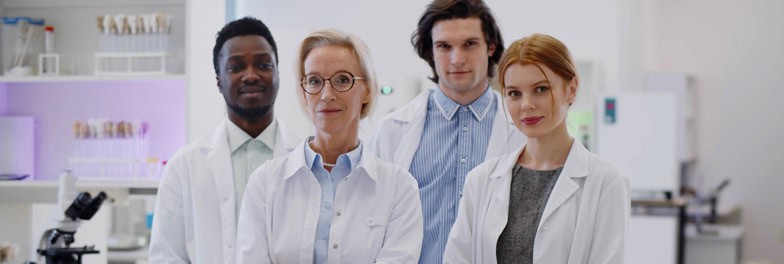How to Transfer From Biomedical Science to Medicine
Posted on 09 Apr 2025

Table of Contents
- How to Transfer From Biomedical Science to Medicine
- Can You Transfer From Biomedical Science to Medicine?
- Are You Able to Work in the UK After Transferring From Biomed to Medicine?
- Can You Go to Medical School With a Biomedical Science Bachelor Degree?
- Should You Study Medicine Abroad?
- Universities That Allow Transfer From Biomedical Science to Medicine in Europe
- Universities That Allow Transfer From Biomedical Science to Medicine UK
- How Long Does it Take to Become a Doctor After Transferring?
- How Study Medicine Europe Can Help You Transfer Biomed to Medicine
- Conclusion
How to Transfer From Biomedical Science to Medicine
Transitioning from a Biomedical Science degree to Medicine is a popular yet challenging pathway. Many students begin with Biomedical Science to gain a strong foundation in human biology, disease mechanisms, and scientific research, often with the goal of entering Medicine later on. While the two disciplines share significant overlap, moving from Biomedical Science to Medicine involves strategic planning, particularly in light of evolving requirements and limited transfer opportunities in the UK. This guide provides a comprehensive look at the current options, pathways, and key considerations for students pursuing this transition both in the UK and across North America, on How to Transfer From Biomedical Science to Medicine.Can You Transfer From Biomedical Science to Medicine?
In the UK, direct transfers from Biomedical Science to Medicine are limited and highly competitive. Only a small number of universities offer official admission schemes, and even these are usually restricted to students completing the first year of a specific Biomedical Science course at the same institution. These internal schemes are designed to identify top-performing students with an interest in Medicine and allow them to re-apply to start from the first year of the Medicine program. However, it is important to note that these are not true credit transfers — students must typically begin the medical course from year one, even if some of the content overlaps with what they’ve already studied. Given the scarcity of these opportunities and the intensity of competition, many students choose instead to complete their full Biomedical Science degree and then apply to 4-Year Graduate Entry Medicine programs. This is generally considered the most viable and structured route for Biomedical Science graduates who wish to become doctors in the UK. In contrast, universities in North America often offer more flexibility. Some medical schools in countries such as Anguilla, St Vincent and the Grenadines,. Barbados accept Biomedical Science students into later years of their Medicine programs, based on completed coursework and academic performance. These options can be more accessible and may allow students to avoid repeating years of study. However, they come with their own considerations, particularly in terms of recognition for future GMC registration in the UK. How to Transfer From Biomedical Science to Medicine is a question that many students askAre You Able to Work in the UK After Transferring From Biomed to Medicine?
A critical consideration for students who transfer into Medicine — especially from abroad — is whether they will be eligible to register and work as a doctor in the UK. The General Medical Council (GMC) currently requires that all prospective doctors complete the full duration of a recognised medical degree from start to finish at a WDOMS-listed institution. This means that if a student transfers into the second or third year of a Medicine course without having completed the full program at that institution, it may affect their ability to gain GMC registration. As a result, students who are considering transferring into Medicine from Biomedical Science — particularly outside the UK — must ensure the medical school is listed in the World Directory of Medical Schools (WDOMS) and that the program is fully accredited and eligible for UK recognition. In most cases, the safest and most straightforward route to working in the UK is to complete a Biomedical Science degree and then apply to a 4-Year Graduate Entry Medicine program in the UK or a GMC-approved medical course abroad.Can You Go to Medical School With a Biomedical Science Bachelor Degree?
Yes, and this is currently the most common and reliable route. Biomedical Science graduates are well-positioned to apply for Graduate Entry Medicine (GEM) programs, which are four-year courses designed for students who already hold an undergraduate degree in a related subject. These programs allow students to bypass the first year of a traditional Medicine degree and fast-track their studies. However, Graduate Entry Medicine is highly competitive. Applicants are expected to have a strong academic record, usually at least a 2:1 classification, and many programs also require relevant work experience or volunteering in a clinical setting. Entrance exams such as the Graduate Medical School Admissions Test (GAMSAT) or the University Clinical Aptitude Test (UCAT) are typically part of the application process, and some universities also use interviews and multiple mini-interviews (MMIs) to assess candidates. Despite the challenges, the GEM route remains a well-recognised and structured option for Biomedical Science graduates, and it offers a direct pathway to qualifying as a doctor in the UK. It is especially appealing for students who are determined to practice in the NHS, as it meets all GMC requirements for registration.Should You Study Medicine Abroad?
Studying Medicine abroad is increasingly popular among students who are unable to secure a place in UK medical schools or who are seeking more flexible admission pathways. Many North American universities offer medical programs taught in English, and some are willing to accept transfers or provide entry into later years based on prior Biomedical Science study. These programs are often more accessible in terms of entry requirements, and some do not require UCAT, GAMSAT, or A-levels in specific subjects. In addition to potentially easier entry, studying abroad can offer lower tuition fees and the opportunity to experience different healthcare systems and cultures. Medical degrees from North America are recognised internationally, and if the university is listed in the WDOMS and meets UK standards, graduates may return to the UK to work after completing the Professional and Linguistic Assessments Board (PLAB). Nonetheless, prospective students should carefully research each institution, verify accreditation, and consider factors such as language barriers during clinical rotations and the overall cost of studying and living abroad. For many students, working with organisations like Study Medicine Europe (SME) can simplify the application process and help identify reputable universities with pathways tailored for Biomedical Science graduates.
How to Transfer From Biomedical Science to Medicine
Universities That Allow Transfer From Biomedical Science to Medicine in Europe
Several European universities accept students from Biomedical Science backgrounds into their Medicine programs, sometimes with the possibility of advanced standing. These include:- New Anglia University, Anguilla
- St James School of Medicine, St Vincent and the Grenadines
- Victoria University – Barbados
Universities That Allow Transfer From Biomedical Science to Medicine UK
While formal transfer options in the UK are rare and mostly internal, a few universities do offer structured schemes that allow students to Transfer From Biomedical Science to Medicine allowing high-achieving Biomedical Science students to apply. These include:- Anglia Ruskin University
- University of Bradford (linked to Leeds MBChB)
- Brighton and Sussex Medical School
- Cardiff University
- University of Exeter
- University of Leicester
- Newcastle University
- Plymouth University
- Queen Mary University of London
- University of Sussex

How to Transfer From Biomedical Science to Medicine



















